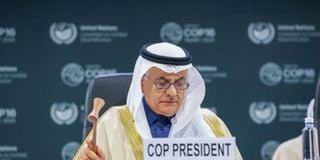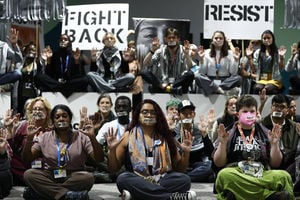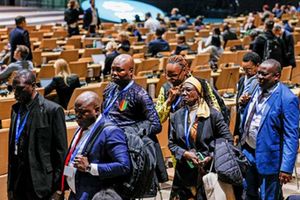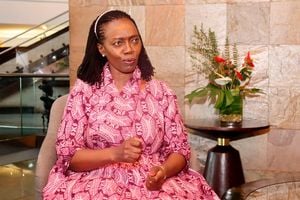No deal is better than a bad deal as UNCCD COP16 ends in stalemate

COP 16 President Abdulrahman Abdulmohsen AlFadley was left with no choice but to gavel UNCCD COP 16 to a close after night long stalemate.
In Riyadh, Saudi Arabia
The world's biggest land conference by the UN ended in stalemate.
The global meeting ended a day later than the deadline set for the end of the summit after all 196 parties plus the European Union failed to agree on a drought protocol that must be accompanied by new financial instruments.
This means that, despite Saudi Arabia's best efforts throughout the two weeks of negotiations, the Parties were completely unable to agree on whether to start negotiations on a new drought framework or a legally binding protocol.
As Friday turned into Saturday, 14 December 2024, Parties were left with no choice but to adopt a procedural decision agreeing to continue discussions on the basis of progress made at COP 16 (contained in an annexe) with a view to adopting a decision at COP 17.
But how exactly did we get here?
In 2020-2022, Kenya experienced one of its worst droughts in 40 years.
Like many other developing countries that have suffered the same and much worse, at COP15 in Abidjan, the Parties to the UNCCD agreed to establish an Intergovernmental Working Group (IWG) to produce a report over two years, which will now formulate policy positions to effectively address drought.
The IWG report offers seven key solutions to tackle drought, desertification and land degradation around the world, and so in Riyadh Parties should decide on the most effective global instrument to end drought, desertification and land degradation in the midst of the climate crisis, with most members favouring a drought protocol with new comprehensive financial instruments.
But where exactly will the money come from?
When Nation.Africa spoke to officials from the US and the European Union attending the conference, they revealed that they were only "mere observers" and not participants, raising the question of who exactly parties like Kenya are negotiating with.
Second, as of Friday, with just one day left before the curtain falls on the talks, negotiators had yet to agree on a framework for the world to address drought and land degradation caused by the climate crisis.
This has raised serious concerns among negotiators and delegates who had expected the Saudi-led talks to have a draft decision ready and uploaded to the official UNCCD website, as required by UN guidelines for climate negotiations.
"As soon as the first draft decision is ready, they should have uploaded it on the official website for all members (196 countries + European Union) to see, question, accept or reject, while providing insights, as is done in other Conferences of Parties (COPs) and even more recently in COP29 in Baku.
This is not happening in Riyadh, instead, the Saudi-led COP presidency has refused to upload the crucial documents despite our requests, leaving most delegates in the dark as to what exactly is happening, what was agreed behind closed doors and what wasn't," a senior negotiator from one of the small island states (SIDS) revealed to Nation.Africa on Thursday, December 12.
He added that the concerns and recommendations from the first draft of the final decision usually inform the second draft, which is then uploaded again so that by the time the final draft comes out, all members have reached some sort of consensus on all the sticky issues.
For this reason, delegates from developing countries and SIDS were concerned that the UNCCD COP16 Presidency wanted to move from "negotiations" to entities, which they were not sure about.
"There should be nothing to hide about what is in these documents, which is why they should have already been uploaded to the UNCCD website in their raw form for the world to see. If you remember, about three weeks ago in Baku, Azerbaijan, Saudi Arabia, a major oil producing country that also produces a lot of the polymers used to make plastics, was accused of trying to change the wording of the draft text at COP29 to suit its own interests," recalled an African Group negotiator at the talks in Riyadh.
"So should we trust Saudi Arabia with a final text that no one has seen, and we don't know how they arrived at it?" The negotiator posed in an interview with Nation.Africa, while agreeing with his colleague from SIDs and equally demanding that the final draft document be made public for everyone to see and interact with.
When Nation.Africa contacted UNCCD COP16 Presidency officials about the concerns raised by negotiators and delegates attending the global talks, a senior UNCCD official tasked with responding on behalf of the Saudi-led COP16 Presidency.
The official admitted that they had not made the document public, but this was because the UNCCD had decided to take a different approach to doing things compared to other COPs, and in fact, there will be no draft text made available until all 196 countries and the European Union come to an agreement.
“We are doing things a bit differently from the way other environmental agreements such as the United Framework Convention for Climate Change(UNFCCC) and the UN Convention of Biological Diversity Conference (Biodiversity COP). The EU and the United States are parties to UNCCD and so Parties are negotiating with EU countries such as France,” UNCCD explained.
"There are already parties like the Africa Group who have already expressed their strong will to make a decision on drought management, but what the direct mechanism will look like, what kind of financial instruments will be used and whether a legal framework will be put in place or not, we are not going to comment at the moment because the negotiations are still going on," the senior UNCCD official told Nation.Africa.
"Once a decision is reached, it will be presented as the final decision of all 196 countries and the EU at the closing plenary and final press conference on Friday at 3 pm Saudi time.
There will be no draft decision that will be shared, what will be shared is the final decision once there is a consensus, which means that the Parties and the EU have agreed to it, and the document will only be sent to the red badge holders, who are the heads of delegation of each of the Parties," he said, explaining the procedure that Saudi Arabia has chosen to follow in leading the talks.
"As the UNCCD secretariat, we are just following the procedure that has been given to us."
As fate would have it, the negotiations were initially suspended four times due to disagreements between the parties, after which press briefings and closing plenaries were cancelled.
At 3 am on Saturday, however, UNCCD COP16 President Abdulrahman Abdulmohsen AlFadley was left with no choice but to show up to wrap up the stalled talks to a conclusion, after parties agreed to resolve their issues at COP17.
In an interview with Nation.Africa and while reacting to the stalemate that saw the world leave Riyadh with nothing but private sector pledges to fight desertification and land degradation amounting to $12.6 billion, Environment, Climate Change and Forestry CS Aden Duale expressed disappointment that the world could not agree on a drought protocol.
"Africa and Kenya, which is a victim of unprecedented, erratic and recurrent droughts due to climate change, will not tire and give up on its decision to continue to push for the adaptation of a globally legally binding drought protocol in future COPs, including COP 17. It's unfortunate that global politics ... is derailing the fight against climate change," CS Duale said.





